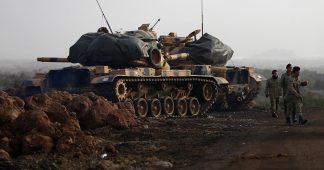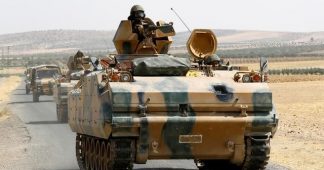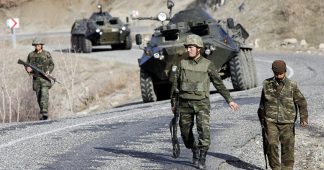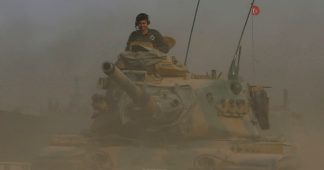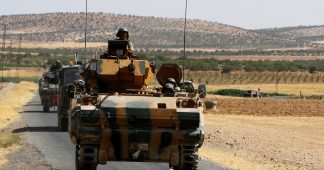February 06, 2018
The successful Syrian army operation to liberate Abu-Duhur airbase left a large enclave (pink) controlled by al-Qaeda and ISIS fighters in east-Hama. Further advances towards Idleb have been halted for now to clean up the cauldron that could otherwise create future troubles behind the lines.

bigger
A Turkish military convoy came from Turkey and went to Al-Eis, an important high point south-west of Aleppo. The convoy was protected by al-Qaeda forces. A similar convoy had earlier been attacked and had to retreat. This time the Turkish troops were attacked by missiles as soon as they had reached their positions. According to Turkish media at least five of the soldiers were wounded and one killed.
The Turks claim that the “observation point” comes as part of its responsibilities under the Astana agreement about a de-escalation zone in Idleb. The Russian’s seem to agree with that, at least for now, but Iranian and Syrian forces in the area see the Turks (rightly) as their enemies intended to hamper their further moves against Idleb city. The Turks in Al-Eis are quite isolated and have no air support. Their positions is more endangered that Turkey seems to appreciate.
Al-Qaeda or a group aligned with it shot down a Russian ground attack air plane by using a man portable missile (MANPADS). There are various speculation where that missile came from but it has long been known that there are warehouses in Turkey and Jordan filled with such missiles ready to be distributed to anti-Syrian forces. The Wall Street Journalreported in February 2014:
Washington’s Arab allies, disappointed with Syria peace talks, have agreed to provide rebels there with more sophisticated weaponry, including shoulder-fired missiles that can take down jets, according to Western and Arab diplomats and opposition figures.
…
Rebel commanders and leaders of the Syrian political opposition said they don’t know yet how many of the Manpads and antiaircraft missiles they will get. But they have been told it is a significant amount. The weapons are already waiting in warehouses in Jordan and Turkey.
The weapons were held back over concerns that they would probably be used against civilian air-liners in other than the intended country.
Now the Washington Examiner speculates about the recent missile attack:
My theory is that President Trump has just shot a lethal warning across Russia’s bow in the Middle East.
Someone provided these ManPADs to the Syrian rebels. And it seems to have only been done recently.
I think it was the Americans. Maybe it was deliberately by President Trump, or maybe it was by the Deep State who want a war with Russia. Russia has been publicly declaring for months that the U.S. is protecting and training Islamist forces in the Syrian theater.
Maybe Trump wanted to send a message. Maybe these ManPADS were more “defensive lethal weapons” like what is being supplied to Ukrainian soldiers in Donbass.
If that was a U.S. move it was a stupid one. Two, or three, or four can play such a game. What happens if Kurds in Afrin suddenly find a stash of MANPADS. Iran aligned forces in Iraq? How about Houthis in Yemen? Or Taliban in Afghanistan?
The Syrian army has deployed new air defenses in north-west Syrian that can cover Afrin canton which is under Turkish attack. Turkish air raids on Afrin have since ceased and even Turkish drones are now avoiding Syrian airspace. Turkey has thus lost a significant part of its reconnaissance and attack capabilities in the area.
The Turkish progress against the YPG Kurds in Afrin is extremely slow. Villages and hills that are taken by day are often lost again at night. Kurdish forces have so far destroyed at least 20 Turkish tanks and other vehicles with antitank missiles of which they seem to have plenty. The Turks are using the Takfiri “Syrian rebels” they have sponsored all these years as their foot soldiers. Why are they willing to die for a cause that presumably isn’t theirs?
The answer may be in this piece about the rise of the major religious organization in Turkey, the Diyanet, which is government sponsored and has control over nearly all religious institutions. It seems more heavily involved in the war on Syria than one might assume:
Having learned of the planned coup during a dinner with intelligence chief Hakan Fidan and Moaz al Khatib (a leading member of the Syrian opposition and ulema), then Diyanet chief Mehmet Görmez (2010–July 2017) rallied the body’s 112,725—strong religious corps, including the imams of some 82,381 mosques controlled by the body.
…
The Diyanet has been active in Syria, revealed by the former chief’s meeting on the evening of the July 15, 2016 coup attempt with Sheikh Moaz al-Khatib—the same individual who caused controversy in 2012 by calling on the United States to reconsider its decision to list Syria’s Jabhat al-Nusra as a terrorist organisation. Al-Khatib is also the former president of the National Coalition of Syrian Revolutionary and Opposition Forces, former imam of the Umayyad mosque in Damascus, and a member of the League of the Ulema of Sham (Rabitat Ulama al-Sham, established in 2012 by opposition ulema from Damascus and Homs, and member of the umbrella group, the Syrian Islamic Council, Al-Majlis al-Islami al-Suri), which is ideologically close to the Muslim Brotherhood.
The Kurds fighting the Turkish supported religious-extremists have some support from the Syrian government. Their wounded are transported to government hospitals. The government controlled corridor between the Kurdish held areas in eastern Syria and in Afrin is open for Kurdish resupplies. Last night a large convoy of fresh fighters and ammunition from eastern Syria arrived in Afrin. These are the forces the U.S. occupation in north-east Syria has allied with under the label SDF. At least parts of the arms they carry were provided by the U.S. military.
Turkey has the second biggest army in NATO. If it really wanted to take Afrin it could surely do so. But so far it has only send company size forces where brigades are need. My suspicion is that the current Turkish operation against Afrin canton is not intended to really capture and control the area. That would require way more professional Turkish army forces and cost thousands of Turkish casualties. What the operation does, and is probable intended to do, is to demonstrate to its NATO partner in Washington that it is indeed aligning with Kurdish YPG/PKK forces that are, from a Turkish perspective, outright terrorists. The attack on Afrin is designed to split the U.S. alliance with the YPG/PKK. (That may well be the reason why it has tacit Russian support.) If it succeeds in doing that it will make a further U.S. occupation of north-east Syria, which is in alliance with the Kurds, extremely difficult.
The U.S. has to decide between the NATO partner Turkey and its Kurdish YPG allies. To deliver weapons to the later who then fight the former is not sustainable. U.S. National Security Advisor McMaster is expected to visit Turkey over the coming weekend. Secretary of State Tillerson will touch down a few days later. What deal will they offer?
Meanwhile little is heard of the remaining ISIS forces near the Iraqi border north of the Euphrates. Many of the thousands of ISIS fighters the U.S. let intentionally escape from Raqqa and who from there traveled east are still at large. The border area is supposed to be U.S./SDF controlled but there seem to be no more efforts ongoing to destroy the ISIS remands there. If the U.S. can not defeat them why does it hinder Syrian forces from crossing the Euphrates to destroy that menace?
One well founded speculation is that the U.S. directs those ISIS fighters to attack the Syrian forces in the border city Abu Kamal just south of the Euphrates. The intend is to disrupt the road that connects Syria and Iraq and thus Beirut and Tehran. There have recently been some serious hit-and-run incidents against the Syrian positions there.
The war on Syria will continue and all the U.S. and Turkish scheming is only prolonging it. Neither of them have learned and decided to either giver up on their aims or to risk all the means that are needed to achieve them.
